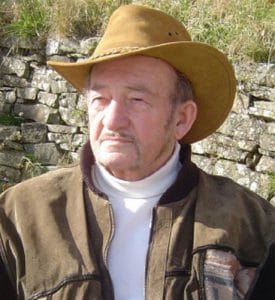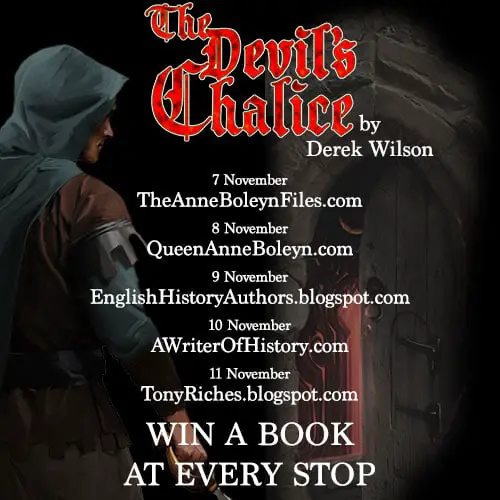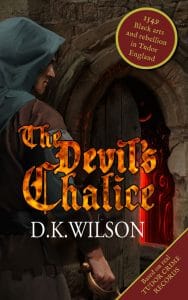 We are honoured to play host to historian and author Derek Wilson today as part of his book tour for his latest historical thriller The Devil’s Chalice. Derek’s publisher, MadeGlobal Publishing, is offering one lucky Anne Boleyn Files follower the chance to win a paperback copy of Derek’s novel – see details at the bottom of the post.
We are honoured to play host to historian and author Derek Wilson today as part of his book tour for his latest historical thriller The Devil’s Chalice. Derek’s publisher, MadeGlobal Publishing, is offering one lucky Anne Boleyn Files follower the chance to win a paperback copy of Derek’s novel – see details at the bottom of the post.
Over to Derek…
Among the many FAQs I receive via email or from people who turn up to my talks, two that come near the top are, “What fascinates you about the Tudors?” and “How did you get to be a professional author earning a living from writing?” The two are so closely bound up together in my life that I find it hard to separate them.
I had the benefit of what used to be called a liberal education (the sort of education Alan Bennet explores so wonderfully in The History Boys). That involved an appreciation and enjoyment of ‘Eng Lit’ and ‘History’, both of which I ended up studying for ‘A’ level. I didn’t realise it then but what was being imparted to me was a fascination with people – their thoughts, beliefs, hopes, fears and interrelationships. I’ve gone on exploring these things ever since – reaching, over the years, deeper into the human psyche (or so I hope). History, and particularly the 16th C to which I’ll return in a moment, is about all that or it’s about nothing (certainly not dates and battles and Acts of Parliament). For example, The Devil’s Chalice provided me with an opportunity to explain how magic influences people (I use the present tense deliberately because the modern vogue for fantasy fiction shows just how deep primordial instincts are even in our secular age). It’s conventional to think of Tudor England as a nation on a journey from Catholicism to Protestantism but that is far too simplistic. The popular rebellions that caused havoc in England in 1549 and which form the background of The Devil’s Chalice were motivated by both traditional and reformist religious passions AND by magic.
One of the villains in the story is Robert Allen, a real-life magus or ‘calker’ (a conjuror of spirits) who appears in the annals of the Tower of London as a prisoner under investigation for prophesying the death of King Edward VI. According to one observer there were currently 500 or more such ‘wise men’ or ‘wize-ards’ or ‘wizards’ in England. A statute of 1542 had condemned any who devised and practised ‘invocations and conjurations of spirits, pretending by such means to get knowledge for their own lucre … and have digged up and pulled down an infinite number of crosses within this realm … to the great offence of God’s law [and] hurt and damage of the King’s subjects’. Allen was a Norfolk man and Norwich was the centre of the most devastating disturbance of the year when a mob led by Robert Kett seized the county town, held it for fifty days and ended up being slaughtered in the bloody Battle of Dussindale. Allen was also known to have friends and supporters at the royal court. From such fragments, I concocted a story which, as well as being exciting, does, I hope, convey an impression of the dangerous chaos which gripped the nation in this crisis year.
In connection with my ‘A’ level studies of ‘English and European History 1485-1700’ I read some books – fact and fiction – which had a profound effect. C.V. Wedgwood was superb on the Thirty Years War and Hilda Prescott wrote a wonderful novel about the Dissolution of the Monasteries – The Man on a Donkey (If you’ve never read it do track down a copy). I went to Cambridge to read History and Theology (I had plans for ordination at the time – but that’s another story) and was able to take a special paper on the Reformation which brought the two disciplines together very neatly and set me on course for immersing myself in the movement which has been my specialist study for sixty years. I believe now even more strongly what I believed all those years ago that the 16th C was the great turning point in western history and that the Reformation was at its heart. It was while I was at university that C.V. Wedgwood came to deliver a public lecture. I was, of course, excited to hear my heroine in person and told my supervisor I intended to go. His reaction was ‘Well, of course, you can, dear boy, but you must remember she’s only a populariser’. I’d like to be able to say that that was the moment I decided to be a popular historian. It wasn’t but it certainly made me realise that history is not the preserve of academics. If it’s not for everyone, it’s for no-one.
This brings us to that other question, ‘How did I become a professional writer?’ In my experience, what often lurks behind that question is another one – ‘How can I make writing my career?’ I heartily wish I had an answer. Alas, Thomas Gray’s observation remains true:
Full many a flower is born to blush unseen
And waste its sweetness on the desert air.
I’m not talking about getting a book into print. There are actually more books being published today than ever before but the sad statistical fact is that there are fewer professional authors than ever before. Over the years I’ve encountered, I think, just about all the stratagems hopeful writers try to climb the greasy pole to self-sufficiency. There’s the creative writing course. Some have achieved success by this route but such tuition (and I have been involved as a tutor) is based on the false assumption, ‘If I could write well enough, I’d get published’. Not true. In any list of requirements for authorial success ‘literary style’ does not come at the top. Another approach is ‘get in the swim’; go and live in London or New York and join the world of journalists, publishers, agents and literary cognoscenti. Some have certainly ‘made it’ this way, but it’s obviously a very major life commitment and one that has to be made early. Then there’s the ‘how to’ book. Sadly, the only people who make money from ‘how to’ books are the authors of ‘how to’ books. Some people hope the internet is their passport to fame and regard no day as complete until they have loosed a number of trivial thoughts to flutter in the cyberspace aviary. A few wannabees may have found financial independence this way but not most.
Self-belief and persistence, as well as being virtuous in themselves, have paid off for quite a few determined hopefuls who have gone on submitting their MSS and battled through snowstorms of rejection slips. It often comes down to a book landing on the right editor’s desk at the right time. When I was in Kenya many years ago a publisher’s rep told me of a lady who tried unsuccessfully to sell him a ‘boring’ story of how she had reared an abandoned lion cub and returned it to the wild. His face was certainly red when Born Free became an international hit and a major film. What all this comes down to is that there is no yellow brick road to Bestsellerville. In my experience, you simply wake up one day and find that you’re there.
Mentioning Kenya brings me to the answer of how I ‘made it’. The answer is chance. Having had no success with various submitted MSS, I gave up the struggle and went to East Africa as a teacher. This was in the immediate aftermath of independence and I found myself teaching history to the young citizens of this proud new nation. Believe it or not, the School Certificate syllabus the boys were studying was ‘Tudor and Stuart England’! Quite rightly the new government said ‘We don’t want this colonial rubbish. As from next year the syllabus will be ‘East African History’. But, of course, there were no text books. In desperation one of the local London publishing house reps asked if I could write one. Of course, I said, ‘Yes’ and then fell to studying the subject like mad. This led to other school text books and, eventually to writing for the trade market. As the old adage goes, ‘Nothing succeeds like success’.
All that was fifty years ago. The journey since then has not always been easy but I have been enormously privileged to earn a living from writing ‘straight’ history books, novels, articles and talking about things that interest me. And what sets my juices flowing at the moment is the adventures of Thomas Treviot, Master Goldsmith of London, during the tumultuous days when the Reformation first hit England. In the early 2000s, I ran a history festival for a few years and one of our guest speakers was C.J. Sansom who had just written his first, splendid Shardlake book, Dissolution. Like The Man on a Donkey, this was also about the last days of English monasticism and Chris and I had a long discussion about why we were both fascinated by the mid-Tudor period. The Treviot stories are not copy-cat books, because they differ in several respects from Chris’s yarns but they are fired by that same desire to bring to life an extremely disturbed period of our history. The Devil’s Chalice, as I mentioned, is set against Kett’s Rebellion but it also embraces chicanery in high places as powerful court factions strive to bring down the Duke of Somerset, uncle to the king and Protector of the realm. If that appeals to you, I hope you will give the novel a try. Most readers have been kind enough to say that they find these books very gripping, though one Amazon reviewer did comment that reading a D.K. Wilson novel was like ‘wading through treacle’. Ah, well, you can please some of the people all of the time …
Giveaway
Do you fancy winning a copy of The Devil’s Chalice? Of course you do! To enter the prize draw, leave a comment below this post saying what historical event/time you’d like to use as a setting for a novel. Leave your comment by mindight Saturday 12th November 2016. One lucky commenter will be picked at random and contacted for their details.
There will be a giveaway at every stop of Derek’s book tour and here is the schedule:

The Devil’s Chalice
Here are the details:
The third book in the acclaimed series of Thomas Treviot Tudor crime thrillers – Based on REAL TUDOR CRIME RECORDS.
The Real Crime
In the steaming summer of 1549 two men languish in the Tower of London. William West is accused of attempted murder. Robert Allen is under investigation for dabbling in the Black Arts. Meanwhile, England is in the grip of rebellions against the boy king, Edward VI. The connections between these facts remains a mystery.
Our Story
London goldsmith, Thomas Treviot, is sent by his patron, Archbishop Cranmer, to discover discreetly what connections West has with leading figures at court. But Thomas has problems of his own: his teenage son has gone off to Norwich to join rebels led by Robert Kett. Trying to find his son and please Cranmer, he is plunged into dangers from peasant mobs, London gangsters and political chicanery, not to mention an enemy wielding occult power…
Once again, D.K. Wilson bases his story on documented facts in order to evoke the feverish atmosphere of 1549’s ‘summer of discontent’ in which magic was as real to people as mob violence and political scheming.
 ‘Derek Wilson is a fine historian – and he can also tell a gripping story. This is historical fiction at its best, effortlessly underpinned by a wealth of research by a writer whose understanding of the period is profound.’ – Alison Weir, author of Katherine of Aragon, The True Queen
‘Derek Wilson is a fine historian – and he can also tell a gripping story. This is historical fiction at its best, effortlessly underpinned by a wealth of research by a writer whose understanding of the period is profound.’ – Alison Weir, author of Katherine of Aragon, The True Queen
Paperback: 282 pages
Kindle File Size: 3159 KB
Publisher: MadeGlobal Publishing (30 Sept. 2016)
Language: English
ISBN-10: 8494489380
ISBN-13: 978-8494489389
ASIN: B01IXZWDO4
Use this link http://getbook.at/chalice to find out more on your country’s Amazon site.
Derek (D.K) Wilson scarcely needs introduction to lovers of history, whether fact or fiction. In a writing and media career spanning almost 50 years he has delighted and stimulated readers with such detailed and well-crafted studies as Uncrowned Kings of England, Hans Holbein – Portrait of an Unknown Man and Henry VIII Reformer and Tyrant.
The Devil’s Chalice is the third in Derek’s ground-breaking series of Tudor crime stories based on real-life unsolved mysteries, novels that rank alongside the works of C.J. Sansom and Bernard Cornwell for fast-paced narrative and attention to period detail.